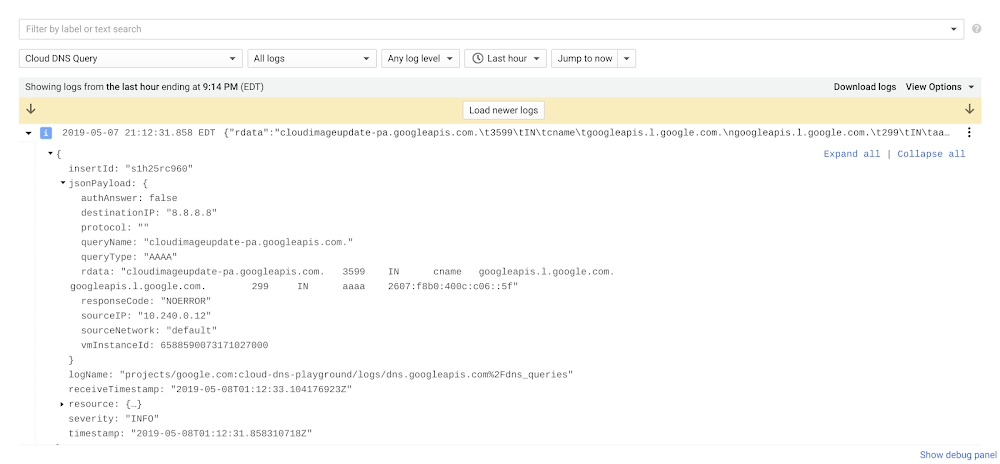
Google Cloud networking in-depth: What’s new with Cloud DNS
May 8, 2019
Microsoft Azure Developer Camp – Reston
May 9, 2019 BOSTON – RED HAT SUMMIT
—
May 9, 2019
—
Red Hat, Inc. (NYSE: RHT), the world’s leading provider of open source solutions, today announced that Emirates NBD, a leading banking group in the United Arab Emirates (UAE), has built a distributed private cloud platform with Red Hat’s hybrid cloud and application programming interface (API) technologies as part of its digital transformation strategy. Its platform provides a common foundation and access to cloud-native services for internal teams, improving integration, collaboration and speed of development. The Red Hat-based cloud helps enable Emirates NBD to better keep pace with its competition, to make banking more available, and to more dynamically offer modern, personalized services to customers. Emirates NBD received recognition for its innovative cloud platform as a winner in the 2019 Red Hat Innovation Awards, which recognize creative thinking, problem-solving and innovative uses of Red Hat technology.
We wanted the flexibility and efficiency of cloud-native stacks while being able to meet regulatory constraints, and Red Hat was the right choice for us to be aligned with open source innovation in cloud-native stacks such as Kubernetes and containers, combined with the security and stability of an enterprise solution.
/>
The award win recognizes Emirates NBD Group’s stated goal to become a global digital leader in banking and deliver first-to-market innovations through its ongoing digital transformation journey. In 2017, the bank set out to enhance the capabilities of its end-to-end technology platforms including IT architecture, infrastructure, security and data. One of its key pillars was establishing a distributed private cloud platform, using technology similar to cloud-native companies while being able to meet required standards of security and resiliency. Using Red Hat OpenShift Container Platform, the industry’s most comprehensive enterprise Kubernetes platform, and Red Hat 3scale API Management, Emirates NBD was able to establish a more secure and scalable private cloud platform with the flexibility to accommodate a future hybrid cloud model. With a common foundation and access to cloud-native services, the platform empowers greater collaboration across the banking group’s internal teams and with third party partners.
Emirates NBD’s private cloud platform provides infrastructure, data and other resources for end-to-end development–from provisioning to production–through an as-a-Service model to groups throughout the bank. Group-wide data storage and access are consolidated on the platform to enable real-time customer intelligence. Red Hat Enterprise Linux provides a standardized infrastructure foundation for Emirates NBD across its hybrid environment of physical servers, virtual machines (VMs), and containers. The bank supports its application programming interfaces in the platform using Red Hat 3scale API Management to make APIs available to its partners and other third parties while helping mitigate security risks and protect sensitive data.
With support for more secure, open API sharing, Emirates NBD launched a developer portal allowing it to more easily integrate and collaborate with FinTechs, government institutions, technology partners and regional institutions.
Emirates NBD has implemented a continuous integration and delivery (CI/CD) pipeline, supported by automated testing, compiling, and transfer of code and containers – all with Red Hat OpenShift Container Platform. The bank runs more than 1,000 containers and more than 500 APIs on its platform with average adoption of the platform increasing 20-30% per month.
Combining Red Hat technologies with agile methods such as iterative development and DevOps, Emirates NBD can focus on innovation rather than operational tasks. It can more efficiently launch new applications and features, with its developers now able to provision and allocate resources in days, rather than the months it previously took. As an example, the bank did a proof of concept for WhatsApp banking in three days that previously would have taken at least six months.
Emirates NBD states that it plans to transition 95% of its 300+ applications onto its private cloud by 2020.
Supporting Quotes
Abdulla Qassem, Group Chief Operating Officer, Emirates NBD
“Establishing a distributed private cloud platform is a key milestone in our transformation project, enabling us to adapt to evolving customer and market needs while continuing to offer the same service quality. We wanted the flexibility and efficiency of cloud-native stacks while being able to meet regulatory constraints, and Red Hat was the right choice for us to be aligned with open source innovation in cloud-native stacks such as Kubernetes and containers, combined with the security and stability of an enterprise solution. We have seen our relationship with Red Hat mature to a close collaboration as they understand where our business is going, and we want to continue to work with them to enhance our use of their products as we expand to hybrid cloud.”
Ashesh Badani, senior vice president, Cloud Platforms, Red Hat
“Emirates NBD is leading the way in transforming its infrastructure and its organization, taking advantage of innovative technologies and agile collaborative working methods to be able to keep pace with changing expectations from customers and the market. We are happy to support Emirates NBD in its strategic evolution to an innovation-focused, always-on bank, unlocking greater value for customers.”
Additional Resources
- Learn more about Red Hat OpenShift Container Platform
- Learn more about Red Hat Enterprise Linux
- Learn more about Red Hat 3scale API Management
- Read more Red Hat customer success stories
- Learn more about the Red Hat Innovation Awards
- Learn more about Red Hat Summit
- Follow @RedHatSummit or via the hashtag #RHSummit on Twitter
- Become a fan of Red Hat Summit on Facebook
Connect with Red Hat
- Learn more about Red Hat
- Get more news in the Red Hat newsroom
- Read the Red Hat blog
- Follow Red Hat on Twitter
- Join Red Hat on Facebook
- Watch Red Hat videos on YouTube
- Follow Red Hat on LinkedIn





